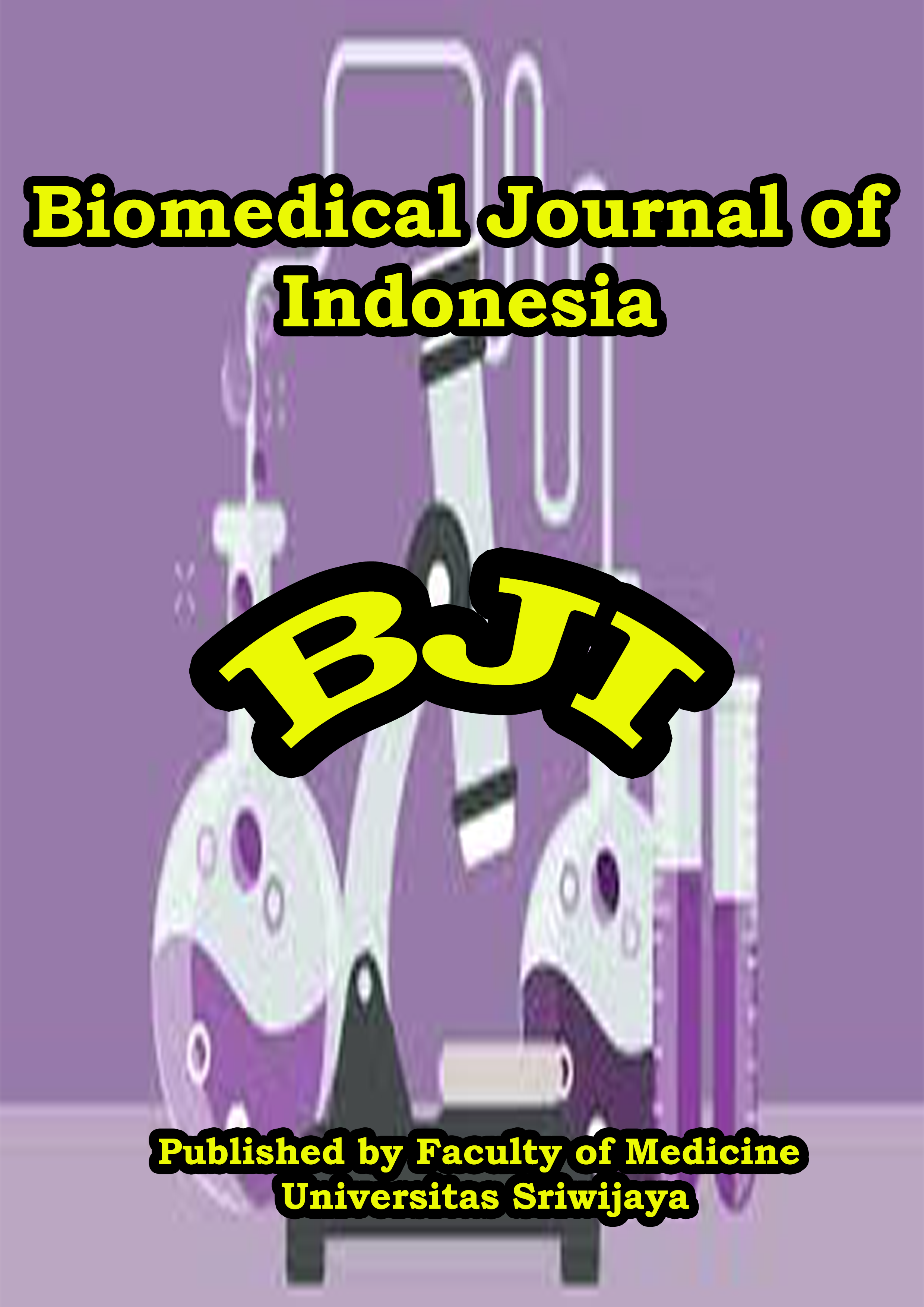Young Adults' Mental Health Status: Investigating GERD's Relationship with Anxiety and Depression
Main Article Content
Introduction. Gastroesophageal Reflux Disease (GERD) is a chronic digestive disorder that occurs when stomach acid or, occasionally, stomach contents flow back (reflux) into the esophagus. This backwash (acid reflux) can irritate the lining of the esophagus, causing uncomfortable symptoms and potential complications. studies suggest that smoking, obesity, anxiety/depression, and older age are some of the contributing factors to GERD development. Young adults in Jakarta showed a 7.5% GERD prevalence rate during 2017. This research explores the potential correlation between anxiety and depression with GERD development in young adult populations. Methods. This study utilized a cross-sectional method to assess the symptoms of anxiety, depression, and GERD using the Hospital Anxiety and Depression Scale (HADS) questionnaire and GERD Questionnaire (GERDQ). The research involved 115 participants aged 18-40 from Pondokkaso Urban Village. The study analyzed gender, anxiety, depression, and Gerd using Fisher Exact tests (p<0.05). Results. Analysis of 115 respondents revealed GERD prevalence in 26 subjects (22.6%), anxiety in 5 subjects (4.3%), and depression in 6 subjects (5.2%). Statistical analysis demonstrated no significant correlation between anxiety (p=1.000), depression (P=0.128), or gender and GERD incidence (P=0.756) among young adult subjects. Conclusions. Statistical analysis revealed no significant correlation between GERD incidence and the variables of anxiety, depression, and gender among young adults in Pondokkaso Urban Village.
2. Kröner PT, Cortés P, Lukens FJ. The Medical Management of Gastroesophageal Reflux Disease: A Narrative Review. J Prim Care Community Health. 2021;12. DOI: 10.1177/21501327211046736
3. Putri Saraswati A, Garianto E. Hubungan antara Konsumsi Kopi dengan Gejala Gastroesophageal Reflux Disease (GERD). CoMPHI Journal: Community Medicine and Public Health of Indonesia Journal. 2021;1(3):177-84. DOI: 10.37148/comphijournal.v2i1.32
4. Ndraha S, Oktavius D, Leonard Sumampouw J, Nyoman Juli N, Marcel R. Faktor - Faktor yang Berhubungan dengan Keberhasilan Terapi GERD. J Kedokt Meditek 2016;22(60). DOI: 10.32922/jkp.v8i1.128
5. Makmun D, Fauzi A, Maulahela H, Pribadi RR, editors. Konsensus Nasional Penatalaksanaan Penyakit Refluks Gastroesofageal di Indonesia. Jakarta: PIP Interna; 2022.
6. Chhabra P, Ingole N. Gastroesophageal Reflux Disease (GERD): Highlighting Diagnosis, Treatment, and Lifestyle Changes. Cureus. 2022;14(8):e28563. DOI: 10.7759/cureus.28563
7. Clarrett DM, Hachem C. Gastroesophageal Reflux Disease (GERD). Missouri medicine. 2018;115(3):214.
8. World Health Organization. Depression and Other Common Mental Disorders Global Health Estimates. 2017. Available from : https://www.who.int/publications/i/item/depression-global-health-estimates
9. Paul S, Abbas MS, Nassar ST, Tasha T, Desai A, Bajgain A, et al. Correlation of Anxiety and Depression to the Development of Gastroesophageal Disease in the Younger Population. Cureus. 2022;14(12):e32712. DOI: 10.7759/cureus.32712
10. Mohammad S, Chandio B, Soomro AA, Lakho S, Ali Z, Ali Soomro Z, et al. Depression and Anxiety in Patients with Gastroesophageal Reflux Disorder With and Without Chest Pain. Cureus. 2019;11(11): e6103. DOI: 10.7759/cureus.6103
11. Choi JM, Yang JI, Kang SJ, Han YM, Lee J, Lee C, et al. Association between anxiety and depression and gastroesophageal reflux disease: Results from a large cross-sectional study. Journal of Neurogastroenterology and Motility. 2018;24(4):593–602. DOI: 10.5056/jnm18069
12. Aro P, Talley NJ, Johansson SE, Agréus L, Ronkainen J. Anxiety is linked to new-onset dyspepsia in the Swedish population: A 10-year follow-up study. Gastroenterology. 2015;148(5):928–37. DOI: 10.1053/j.gastro.2015.01.039
13. Kessing BF, Bredenoord AJ, Saleh CMG, Smout AJPM. Effects of Anxiety and Depression in Patients With Gastroesophageal Reflux Disease. Clinical Gastroenterology and Hepatology 2015;13(6):1089-1095.e1. DOI: 10.1016/j.cgh.2014.11.034
14. Syam AF, Hapsari PF, Makmun D. The Prevalence and Risk Factors of GERD among Indonesian Medical Doctors. Makara Journal of Health Research. 2016;20(2):35-40. DOI: 10.7454/msk.v20i2.5740
15. Krigel A, Lebwohl B, Yadlapati R, et al. Association of patient gender and gastroenterologists’ diagnosis and management choices in gastroesophageal reflux disease. Diseases of the Esophagus. 2021;34:doab019. DOI: 10.1093/dote/doab019.
16. Ajjah BF, Mamfaluti T, Putra TR. Hubungan pola makan dengan terjadinya gastroesophageal reflux disease (GERD). Journal of Nutrition College. 2020;9(3):169-79.
17. Gosal D, Santoso RE, Firmansyah Y. Association between gastroesophageal reflux disease-questionnaire factors and gastroesophageal reflux disease incidence at Kardinah General Hospital inpatient wards. Int J Adv Med. 2021;8(2):152-157. DOI: 10.18203/2349-3933.ijam20210260.
18. Bakry S, Al-Zahrani S, Rashed A, Alharthi T, Bakry S, Siddiqui M. The association of anxiety and depression among health specialties students with GERD in Makkah city, kingdom of Saudi Arabia (KSA). Cross-sectional study. Saudi Medical Horizons Journal. 2022;2(2):17–28. DOI: 10.54293/smhj.v2i2.30
19. Simadibrata M, Aloys J, Simadibrata D. A to Z Penyakit GERD (Pertolongan Pertama Mengenal dan Menuntaskan GERD). Elex Media Komputindo; 2023.
20. Yang XJ, Jiang HM, Hou XH, Song J. Anxiety and depression in patients with gastroesophageal reflux disease and their effect on quality of life. World J Gastroenterol. 2015;21(14):4302–9. DOI: 10.3748/wjg.v21.i14.4302
21. Shanmugapriya S, Saravanan A, Shuruthi S, et al. Association of gastroesophageal reflux disease with anxiety, depression, and sleep disorders. Journal of Medical Sciences. 2021;41(1):9–16. DOI: 10.4103/jmedsci.jmedsci_51_20
22. Sadafi, S., Azizi, A., Pasdar, Y. et al. Risk factors for gastroesophageal reflux disease: a population-based study. BMC Gastroenterol.2024;24(64). DOI: 10.1186/s12876-024-03143-9

